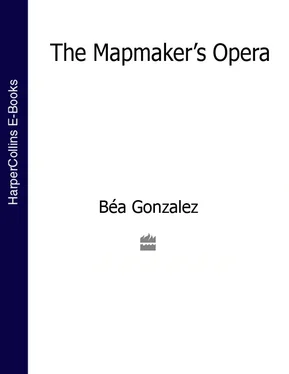Ah, and there she was now, head bent, eyes closed.
“Bueno, señores,” Emilio said to his group, his eyes fixed on the young woman’s face. “Let us now take a final walk around the cathedral to inspect its jewels in all their magnificence.”
“What did he say?” an old man, exhausted already by Emilio’s first frenetic run around the building, asked his wife. “Not another damned walk around the cathedral!” he added furiously, beneath his breath.
Ah, but the English. Let us just admit this one thing now, shall we? Among their greatest virtues are their impeccable manners. So the unhappy man circled and then circled again, breathing in the damn “jools” of this magnificent cathedral, never suspecting that the tall, hawk-nosed seminarian who was leading them about was inspecting a young girl with all of this to-ing and fro-ing, this vamos- ing and venga- ing.
In the meantime, oblivious to Emilio and the English in his charge, Mónica Clemente continued, head bent over rosary, to issue her prayers. Who was she praying for? Emilio wondered, eyes glued to her face. Was it for a mother, ailing and near death? Perhaps her prayers were being said for a sickly brother. Pray God, let them not be meant for a suitor, he now thought, and thinking this, suddenly stumbled.
Mónica Clemente, sweet of face yes, but not, as he would later find out, so sweet of tongue, was not praying for a father or a mother, a brother or, thank God, a suitor. Mónica Clemente was praying, as she did every day, in order that she be granted her most cherished desire. And what is this, you ask? Ah, in a million years you will never guess. For Mónica Clemente, thin of lip and long of nose but sweet of face nonetheless, was praying fervently that the wife of Don Ricardo Medina—Doña Fernanda—be sent to her death.
“And it would be better if it were sooner rather than later,” she whispered between her many Padre Nuestros, her countless Ave Marías.
“And not without a little pain,” she added, as an afterthought.
But this, claro, only if the good Lord Himself should think it best.
SCENE TWO
We listen to the woes of Doña Fernanda
Enter stage left now Doña Fernanda Olivares—the woman whose death Mónica prayed for so fervently—an imposing figure in possession of her own map, though not, it is true, a map any cartographer would easily make sense of. This map was a catalogue of treachery, one she created in the darkest hours of the night and which she brought into the light at dawn. Mira, she would whisper to herself, fingering the imaginary parchment, these are the places where the heart has withered bit by bit. In the corner is the house that lies west of the Calle San Vicente, home to many of Seville’s booksellers and several women of ill repute. Moving east—the house of Doña Alicia first, and almost next to it, that of Doña Lucía. And then there is the city of Malaga, all sun-drenched and blue water, a dot so brimming with affronts that it threatens to spill into the sea and blur away the details of the parchment.
The dots that were scattered across this map were responsible for making Doña Fernanda a very unhappy woman, a fact she used like a shield, revealing it at opportune moments to gain the upper hand. She was—in Mónica’s words—imperious, domineering and hard on the eyes, but Mónica had good cause to dislike her, so it is best, perhaps, to try to get at her through other means. What was true, because it had been passed on from generation to generation like a canker gnawing in the family mouth, was that Doña Fernanda had forever lamented having known only fourteen days of happiness in all of her life. For years, her family had waited for her to add one day to that count, but no fiesta, wedding or family celebration ever made an impression on her, and she died leaving those two weeks firmly imprinted in her children’s minds.
What did make her happy (or at least less rancorous) were the visits of Don Pedro, her parish priest, a corpulent fellow with a knack for attracting all of the city’s gossip, and a ferocious appetite for kidneys and stewed beef. Every weekday afternoon, at exactly half past three, Don Pedro would amble over to the house of Doña Fernanda, making sure that all of Seville knew where he was headed and the ceremony with which he would be received.
And what ceremony! The Seville of the time was not so much a city as a medieval court with rules of conduct that would have made even the most enamoured knight desist his courting in despair. Take the visiting hours as an example. Why was Don Pedro so insistent that he must arrive at the gates of the Medina house at no later than a quarter to four? The answer resided in the rules of etiquette that governed the lives of the Sevillanos of the time, for it was strictly held that all visits should occur between the hours of three and six, with the most formal visitors being received in the first hour, the semi-formal in the next and the most intimate arriving in the final hour between five and six.
Don Pedro had been visiting Doña Fernanda for a decade and should have graduated to the final visiting hour long before, had he himself not strenuously objected. Claiming the hour between three and four was the only part of his day with some time to spare, time to be provided “to you, of course, Doña Fernanda,” he would say, hands on his chest, “to which I add all my attentiveness and my respect,” at which point the corpulent priest would attempt, with some difficulty, to bow and kiss Doña Fernanda’s hand, a hand that would be quickly retrieved before the cleric’s flaccid lips ever once managed to raze the lady’s clammy skin.
The master servant of the house, a certain Don Raimundo, who hated the Church and, more than the Church, all of the priests, never failed to rail against the pompous prelate in the privacy of the kitchen at the back of the house.
“That pious ass says he lacks the time to come visiting at a later hour,” he would complain to the other servants of the house. “I’ll tell you what he does with his time. The weasel spends it inside the bars of Triana, rubbing shoulders with the gypsies and thieves—drinking and laughing it up when he should be saying a Mass to save some poor bastard’s soul from the pit of purgatory. It’s just like a priest, isn’t it? A bleeding wound on the corpse of Spain.” Ay sí, Amén the servants would all respond with gusto, for Don Pedro had few admirers among the members of the group, a group who resented his daily visits, his disdaining gaze, his insistence on a cold drink of agraz and most especially, the special treatment he demanded for his hat.
Ah, his hat. In the whole history of Seville, nothing had ever generated more conversation than Don Pedro’s black felt hat. It was an ordinary top hat, much like the ones worn by the men of the day, but it sat rather uneasily atop the priest’s head, contrasting oddly with his clerical collar and his long, black cape. That he should be demanding special privileges for his hat—“a cushion no less,” the master servant had guffawed to the cook, outraged, when first told of it, “That barrel of a priest is looking for a cushion for his hat”—was unheard of. Raimundo himself could hardly believe it, would not have believed it, had he not heard it from Doña Fernanda’s own mouth: “Raimundo, make sure Don Pedro’s hat is placed on that chair cushion by the door,” she had said.
“I beg your pardon,” he had replied, earnestly confused, for many were the archaic customs in this land bottled for antiquarians, a land where one of its ancient kings—finding himself seated too close to the fire—preferred burning to death than breaking the rules of decorum by moving away from the fire or shouting for help. In this land of hierarchies, titles and entitlements, the worth of a man could indeed be determined by the treatment accorded to his hat.
Читать дальше












